This is “Development of the English Language”, section 1.1 from the book British Literature Through History (v. 0.1). For details on it (including licensing), click here.
For more information on the source of this book, or why it is available for free, please see the project's home page. You can browse or download additional books there. To download a .zip file containing this book to use offline, simply click here.
1.1 Development of the English Language
PLEASE NOTE: This book is currently in draft form; material is not final.
Learning Objectives
- Recognize the key influences on the development of the English language.
- Understand the broad timeline of the development of the English language.

Norman Invasion portrayed in the Bayeux Tapestry.
The English language and English literature began with the recorded history of Britain.
The early history of England includes five invasions which contributed to the development of the English language and influenced the literature:
- the Roman invasion
- the Anglo-Saxon invasions
- the Christian “invasion”
- the Viking invasions
- the Norman French invasion
The Roman Invasion
At the time of the earliest written records, the British islands were inhabited by Celtic people known as the Britons. (See Map 1.) Although the Roman Empire made initial contacts with the Celtic people in Britain around 55 B.C., the Roman invasion of Britain began around A.D. 43. The Celtic people resisted but were unable to fend off the invading Roman troops. One of the principal figures fighting the Romans was the Celtic queen Boudicca. Unlike their Roman counterparts, Celtic societies allotted women rights often equal to those of men. When her husband, an ally of the Romans, died, the Romans took over the land of her tribe, the Iceni, flogging Boudicca and raping her daughters. Boudicca led her people in revolt and for some time managed to hold back the mighty Roman legions.
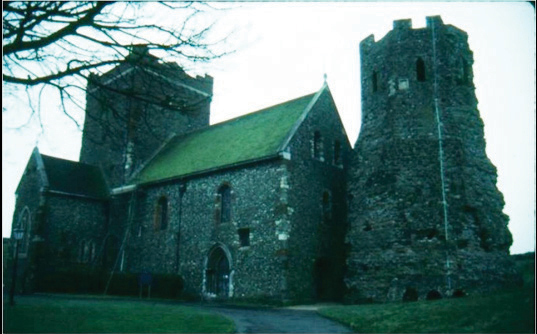
Roman lighthouse at Dover.
Long familiar with Britain as a source of tin, the Romans conquered Britain around A.D. 44 and set up fortresses, light houses on the coast, and a defensive wall across the entire Northern border of England named Hadrian’s Wall for the Roman emperor Hadrian. As they did in many parts of the world, the Romans built villas with beautiful mosaics, a series of roads which were used for centuries, and great Roman baths, such as those at Aquae Sulis, now known as Bath, England. View a video mini-lecture that explains the Roman invasion.
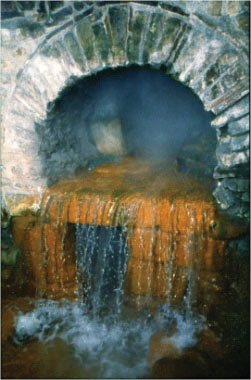
Roman bath overflow at Bath, England.
How did the Roman invasion affect the development of the English language? While there is no direct linguistic connection, the Roman occupation of Britain and their subsequent abandonment of the country set the stage for the most important invasion, the Anglo-Saxon invasion which provided the foundation of the English language.
The Anglo-Saxon Invasions
At the fall of the Roman Empire (ca. 420), the Roman troops were called back to the continent, and Britain was left undefended. This period of time produced the figure that was transformed in legend into King Arthur. The man who formed the basis of the Arthurian legend was probably a descendent of Celtic and Roman people who led his followers in resisting the Anglo-Saxons. This resistance occurred long before the days of knights in armor mounted on horseback, the picture of King Arthur found in most stories.
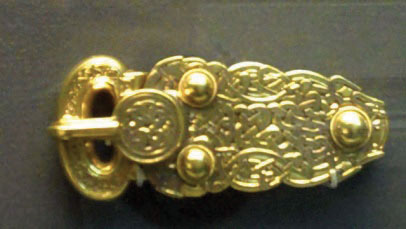
Anglo-Saxon ornament in the British Museum.
The Anglo-Saxons were Germanic tribes who began raiding the coastal areas of Britain around 450. (See Map 2.) For over 100 years, the Anglo-Saxons continued to raid and gradually to settle in Britain, pushing the Celtic people into the remote parts of Britain—into what are today the countries of Wales, Scotland, and Ireland. (See Map 3 and Map 4.) With them, they took their Celtic language which formed the basis of the Gaelic languages of Scotland, Wales, and Ireland. (See Map 5.) Few Celtic words remain in today’s English; those few are primarily place names such as avon for river (as in the English town Stratford-upon-Avon) and words associated with the countries to which the Celts dispersed such as glen (valley), loch (lake), and cairn (pile of stones) from Scotland.
The Anglo-Saxon Germanic Language Is the Foundation of the English Language
The culture of the Anglo-Saxons is much in evidence in Old English literature, especially in the concept of the Germanic heroic ideal. The primary attribute of the heroic ideal was excellence—excellence in all that was important to the tribe: hunting, sea-faring, fighting. The leader of each tribal unit, often family units especially in earlier years, gained his position because of his physical strength and capabilities in the activities necessary for survival. Each man of the tribe, called a thanean Anglo-Saxon warrior loyal to a specific leader or retainer, an Anglo-Saxon warrior loyal to a specific leader, swore his allegiance, and in return his leader rewarded him with the spoils of their battles and raids. A group of Anglo-Saxon warriors bound by the reciprocal king-retainer relationship was known as a comitatusa group of Anglo-Saxon warriors bound by the reciprocal king-retainer relationship. An example is the group of Geats led by Beowulf.
These Anglo-Saxon tribes led violent lives governed as they believed by wyrdthe Anglo-Saxon word for fate, the power that controls one’s destiny, the Anglo-Saxon word for fate, the power that controls one’s destiny, and bound by loyalty to their comitatus, including the obligation of exacting revenge for their comrades. A formal system of wergilda price placed on a man’s life and paid in lieu of blood revenge, a price placed on a man’s life and paid in lieu of blood revenge, provided an honorable way to end a feud or to satisfy the demands of revenge.
By the year 700, various tribes settled in different parts of Britain, each with its own dialect. (See Map 6.) The language generally known as Old English came primarily from the dialect of the West Saxons, located in an area known as Wessex.
Although mostly illiterate, the Anglo-Saxons had a rich tradition of oral literature. Gathered in the mead hall with its long tables around a central hearth, the Anglo-Saxons listened to tales of battle glory sung or chanted to the strums of a harp. The scopthe tribal poet/singer, the tribal poet/singer, entertained and commemorated significant events by composing and performing tales such as Beowulf. Although many scholars have varying ideas about how these performances might have sounded, little is known of secular music during this time period, and there is of course no evidence to suggest whether the songs were more like chants with strums of the harp perhaps in the caesura or whether they were lively, rambunctious, melodic performances. We might remember that in Beowulf, it’s the sound of laughter, the music of the harp, and the singing of the scop that drives Grendel to attack Heorot.

Reconstruction of Anglo-Saxon harp from remnants in Sutton Hoo.
The Anglo-Saxon invasion established the English language and the earliest English literature. The next important step, the recording of that literature, came with the return of Christianity to Britain.
The Christian “Invasion”
Although certainly not a military invasion like the others in the list, the arrival of Christianity in Britain was as influential on the language and the culture, and therefore on the literature. Christianity was not unknown in Britain when St. Augustine arrived in 597 but had appeared during the time of the Romans. However, Christianity was suppressed along with the Celtic tribes during the Anglo-Saxon invasions. In 597, St. Augustine arrived on a mission to Christianize the pagan Anglo-Saxons, and the literature of the time bears witness to his influence. During the same time period, Celtic Christianity continued to spread from the northern and western reaches. The Anglo-Saxons were mostly illiterate; therefore, their oral stories were not written until the Christian monks recorded them. Many twentieth-century scholars believed that Beowulf, for example, was originally a pagan story and that references to Christianity are interpolations made by the recording monks in their reluctance to perpetuate strictly pagan literature or as a way of converting still-pagan Anglo-Saxons. Most scholars now believe that Beowulf was more likely composed by a Christian author who drew on and perhaps paid homage to his pagan roots.
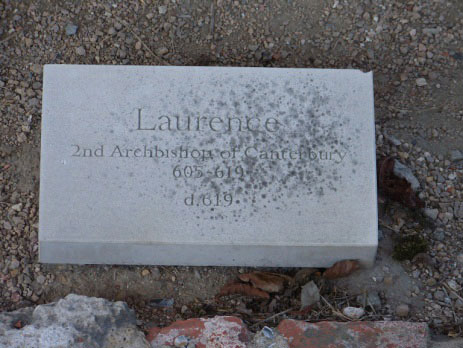
Burial site of St. Augustine’s successor Laurence in the abbey ruins.
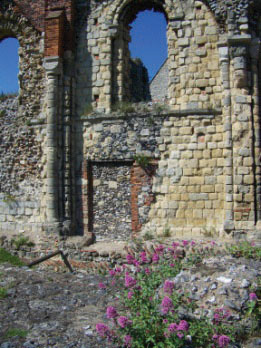
Ruins of St. Augustine’s Abbey.
Many words with Latin roots found their way into the English language with the assimilation of Christianity into the culture, many of them words for religious concepts for which the Anglo-Saxons had no terms, such as angel, priest, martyr, bishop.
The establishment of monasteries in Britain also led to the production of beautifully illuminated manuscripts, such as the Lindisfarne Gospels. The British Library’s Virtual Books Online Gallery allows you to virtually turn the pages of the Lindisfarne gospels.
The Viking Invasions
Between 750 and 1050, another group of war-like, pagan tribes raided Britain and gradually established settlements, primarily in the north and east of England. The Vikings were from the area now known as Scandinavia. While they shared cultural similarities with the Anglo-Saxons, they brought their own language, another impact on the developing English language. Words such as sky, skin, wagon originated with the language of the Vikings.
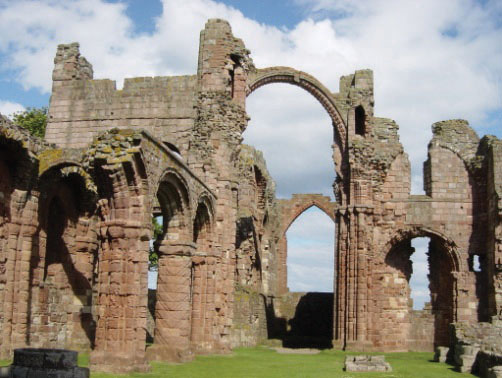
Ruins of Lindisfarne Priory.
Sidebar 1.1.
The Anglo-Saxon Chronicle (translated by E. E. C. Gomme, 1909) describes the Viking raid on the Holy Island of Lindisfarne:
“Here terrible portents came about over the land of Northumbria, and miserably frightened the people: these were immense flashes of lightening, and fiery dragons were seen flying in the air. A great famine immediately followed these signs; and a little after that in the same year on 8 June the raiding of heathen men miserably devastated God’s church in Lindisfarne island by looting and slaughter.”
These fishing huts on the Holy Isle of Lindisfarne are built in the shape of overturned Viking boats, still suggesting the Viking heritage of this area as a result of the Viking raiding parties and the eventual coming of Viking settlers. The English language also retains evidence of the Viking influence. In northeastern England, place names recall their Viking settlers: York from Jorvik and Whitby from the Viking by meaning a farm.

Alfred the Great negotiated a peaceful settlement with the Vikings by partitioning Britain in what was known as the Danelaw, establishing a period of relatively peaceful coexistence in which the language and the culture mingled.
The Norman Invasion
The year 1066 is possibly the most important date in the history of Britain and in the development of the English language. When William the Conqueror defeated the English King Harold at the Battle of Hastings, he brought to England a new language and a new culture. Old French became the language of the court, of the government, the church, and all the aristocratic entities. Old English, the language of the Anglo-Saxons, existed only among the conquered lower orders of society. However, within three to four hundred years, the English language emerged, greatly enriched by French vocabulary and distinctly different from the Anglo-Saxons’ Old English, Chaucer’s language, now referred to as Middle English.
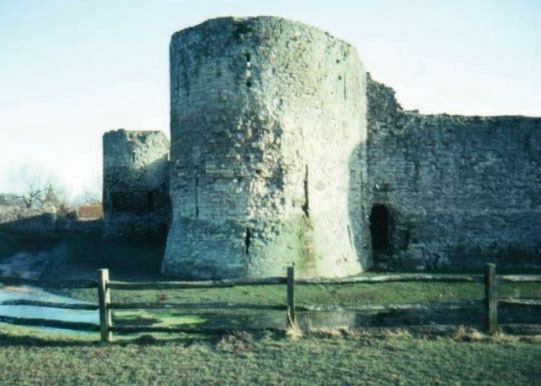
Pevensy Castle ruins—Pevensy Castle was built by William the Conqueror on ruins of Roman and Anglo-Saxon settlements.
Video Clip 6
The Norman Invasion: William the Conqueror and the Battle of Hastings
(click to see video)The British Library provides an interactive timeline that traces the development of the English language, beginning with Beowulf.
Key Takeaways
-
The development of the English language was influenced by 5 events:
- the Roman invasion
- the Anglo-Saxon invasions
- the Christian “invasion”
- the Viking invasions
- the Norman invasion
- The Germanic language of the Anglo-Saxons, known as Old English, is the foundation of the English language.
Exercises
- Construct a timeline which includes key events in the development of the English language.
- On a map of the British Isles, locate areas of Roman settlements, Celtic settlements after the Roman invasion, Anglo-Saxon settlements, Canterbury (the site of St. Augustine’s church and monastery), Viking settlements, and the Holy Island of Lindisfarne.
- On a contemporary map of England, locate cities whose names contain recognizable Roman influence such as castor or cester and wich or wick; Anglo-Saxon influence such as stow, ham, ton, or bury; Viking influence such as by, thorpe, or thwaite; and Norman influence such as beau, bel, ville, or mont.
Resources
Maps
- Celtic Peoples of Roman Britain. Britannia History.
- Roman “Saxon Shore” Forts. Britannia History
- Saxon Invasions and Land Holdings. Britannia History
- Saxon Tribes and Celtic Holdings. Britannia History
- Saxon Control. Britannia History
General Background
- English Language and Literature Timeline. British Library.
The Britons
- “Arthur: King of the Britons.” David Nash Ford. Britannia.
- “Boudicca. The Celtic Arts and Cultures Website. The University of North Carolina at Chapel Hill.
- “Britons (Celts). John Weston. Data Wales.
-
British Museum Online Tours:
The Romans
- Hadrian’s Wall. “Hadrian: Empire and Conflict.” The British Museum.
The Anglo-Saxon Invasions
- “Alfred the Great.” Monarchs. Britannia.
- “The Anglo-Saxon Chronicle.” The Online Medieval and Classical Library.
- “The Anglo-Saxon Fyrd c.400–878 A.D.” Ben Levick. Regia Anglorum.
The Arrival of Christianity
- “St. Augustine of Canterbury.” Terry H. Jones. Saints.SPQN.com.
- Lindisfarne Gospels. Virtual Books. Online Gallery. The British Library.
- “The Venerable Bede (672–735).” Religion Facts.
The Viking Invasions
- “The Danelaw.” Britannia.
Videos
- “The Anglo-Saxon Invasion: Beowulf and the Sutton Hoo Exhibit.” Dr. Carol Lowe. McLennan Community College.
- “The Christian Invasion: St. Augustine’s Abbey, Canterbury.” Dr. Carol Lowe. McLennan Community College.
- “The Lindisfarne Gospels.” Dr. Carol Lowe. McLennan Community College.
- “The Norman Invasion: William the Conqueror and the Battle of Hastings.” Dr. Carol Lowe. McLennan Community College.
- “The Roman Invasion: Boudicca and the Celts.” Dr. Carol Lowe. McLennan Community College.
- “St Gregory’s Minster, Kirkdale.” Dr. Carol Lowe. McLennan Community College.
- “The Viking Invasion: Chester, England.” Dr. Carol Lowe. McLennan Community College.
Medieval Manuscripts
- Catalogue of Digitized Medieval Manuscripts. Center for Medieval and Renaissance Studies. University of California, Los Angeles.
- Digital Scriptorium. Columbia University and University of California, Berkeley.




